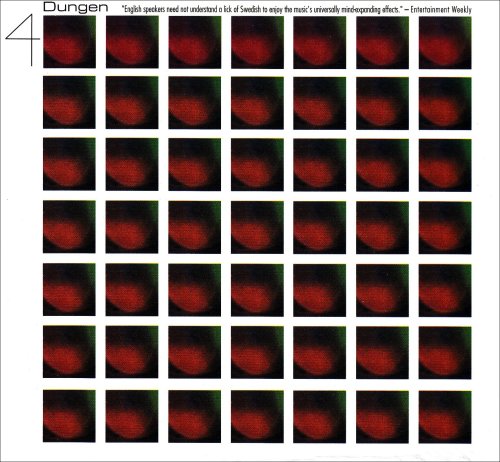
Dungen
4
Release Date: Sep 30, 2008
Genre(s): Indie, Rock
Record label: Kemado
Music Critic Score
How the Music Critic Score works
Album Review: 4 by Dungen
Great, Based on 6 Critics
Based on rating 8.4/10
Scandinavian band refuses to be pigeonholedThis Swedish quartet’s fourth album contains 10 concise but full-bodied pieces, half of them instrumental, the rest sung in Swedish by pianist/producer/bandleader Gustav Ejstes. What’s most surprising about this set is its stylistic range, encompassing the lunar soundscapes of Sigur Rós (“Sätt Att Se”), the groove-based jazz of Weather Report (“Maleras Finest”), mutated bossa nova (“Det Tar Tid”) and Eno-esque ambience (“Bandhagen”), all intercut with shredding rave-ups featuring guitarist Reine Fiske (“Fredag”), who ensures that 4 won’t be consigned to background-music status. Unexpected references pop up throughout—for instance, the lysergic chug of Jimi Hendrix’s “Are You Experienced?” in “Samtidigt 1,” the organ vamp from CSNY’s “Carry On” in “Ingenting Ar Sig Likt.
Based on rating 8/10
"Marleras Finest," in particular, mixes piano-fueled jazz with vintage elevator music, sounding like something that would've piped through the speakers of a 1960s dentist's office after a laughing gas leak. Elsewhere, the bandmates turn their amplifier knobs to the breaking point while pummeling through a series of improvised psych-rock freak-outs. "Samtidigt 1" is a freewheeling guitar showcase taken from a jam session -- it fades in and fades out, seemingly stretching on for hours on either side of the snippet -- and "Samtidigt 2" reprises the same approach several songs later.
Based on rating 8.0/10
Let’s get uncomfortably music-geeky for a moment and talk about drum sound. Yes, seriously. There’s a reason Dungen’s breakthrough single, “Panda,” opened with a drum solo. Dusty and dry, hollow and cavernous, those stuttering drum hits summarized bandleader Gustav Ejstes’ entire aesthetic vision in a scant 18 seconds of boom-bap.Writing about the group’s new album, 4, the temptation is to focus on what has changed since then.
Based on rating 3/5
Since prog is still a four-letter word for many, Dungen mastermind Gustav Ejstes could be taking a risk by steering away from mind-melting guitar freak-outs and into ponderous piano-led progressive territory. Even with Dungen's typically amped-up assault turned way down, the jazzy 4 album makes for an engaging listen even if there's only one shred-fest, the blazing Samtidigt 1, which seems to have been added as an afterthought to placate fans of ye olde crankin' Dungen. Other than that lone detour, it's a totally mellow set where flute often takes precedence over guitar.
Opinion: Excellent
With its aptly titled fourth album, Dungen has put the stoner-rock community on notice. No longer will the Sabbath-worshipping decibel peddlers have the blighted neighborhood all to themselves. These psychedelic Swedes are moving in and gentrifying things with their beautiful instrumentals full of piano, strings and—what in the name of Tony Iommi?—flute.
Opinion: Very Good
The overwhelming acclaim accorded to Dungen’s Ta Det Lugnt was baffling. Sure, Dungen main man Gustav Ejstes achieved a pleasant enough mix of exploratory psychedelia, 1969 edition, and nascent prog under challenging one-man band conditions, but once you got past the impressiveness of its construction there wasn’t much to savor. Its successor Tio Bitar was much better, even if the theft that went into its creation was much more obvious.

